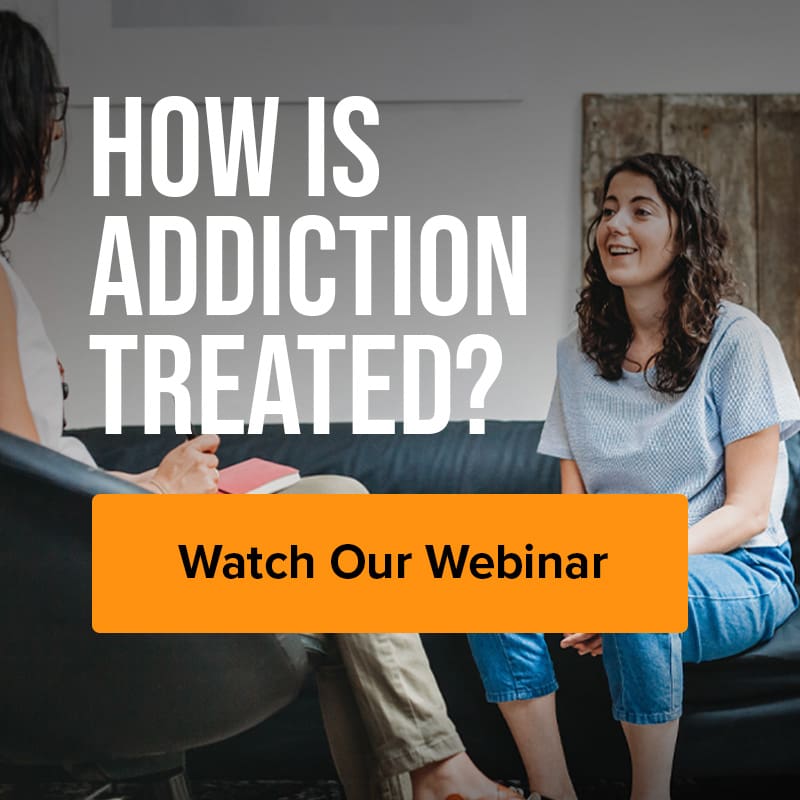It is normal to be unsure of what to say and what to expect when talking to a loved one who is suffering from an addiction. Even if you are not comfortable talking about it, you should do so as soon as possible in order to help them. Problem use can trigger anxiety or depression, impair the proper functioning of organs such as the liver and kidneys, and can lead to serious and possibly fatal health problems. Fortunately, this disease can be effectively controlled with your support and evidence-based treatment tailored to the needs of the person suffering from addiction.
Does my loved one need my help with their substance use disorder?
How to know if someone is struggling with addiction
Your loved one may be exhibiting some worrisome behaviour, but how do you know whether they are experiencing a rough patch or a true addiction? Recognizing to increase their chances for recovery. In general, a person with a substance use disorder:
- does not take care of themselves anymore;
- has increased mood swings, is not their self on a daily basis;
- has increased difficulty achieving daily tasks (ie at work or school);
- is unable to control their consumption;
- uses substances to help cope with difficult situations;
- has increased the frequency and quantity of their substance consumption;
- may lose consciousness and suffer amnesia as a result of the substance;
- finds more pleasure in consuming than in being with friends or family.
There is no single cause of addiction; it is often the result of a combination of genetic and social factors. The individual may have a genetic predisposition or an underlying mental health disorder that triggers and fuels the cycle of addiction (called a concurrent disorder).
Am I the right person to talk to my loved one about their addiction?
If you are the spouse, friend or family member or a person struggling with addiction, you’re likely the best person to start the discussion. Your loved one trusts you and knows that you care about their well-being. It’s normal to be worried or unsure of how to approach the subject. Here are some common mindsets that can set back the conversation:
I am afraid that they won’t talk to me anymore.
Understand that your loved one may be reluctant to have this conversation at first. In order to maintain your relationship, you should be clear that you are concerned for their wellbeing and want to help. By identifying yourself as an ally and following them on their steps to recovery, your relationship can become even stronger than it is now.
I am not a professional. I’m worried that I won’t say the right things.
Starting the conversation is definitely not an easy thing to do. You can’t predict your loved one’s reaction, but you can prepare yourself for the discussion. It’s all about the approach. Before you talk about it, make sure you understand addiction and have solutions to offer. Many people research potential groups, counsellors or programs that could be of use prior to starting the conversation.
How to prepare for a conversation about addiction
Educate yourself on addiction
Take the time to research and understand addiction, how it works, and why it happens. You don’t need to be an expert on the topic, but it is helpful to have a general understanding of their situation before beginning the conversation. This will help you to better understand and empathize with them so that you can have a more positive and open conversation. Below are some important things to know before approaching the subject.
How can an addicted person not realize that they are addicted?
While their addiction may seem obvious to you, it is more difficult for the person experiencing it to identify what is happening. Addiction begins in the unawareness stage. This is when the person consumes a substance in increasing frequency and quantities, but do not find this situation abnormal. They do not try to solve their problem because they do not recognize it. After a major event (such as an arrest, missing an important meeting, or letting down a loved one), an addicted person may enter into the awareness stage. However, this does not mean that they will always seek help. The misconception and stigma surrounding addiction often discourages people from seeking help.
Addiction is a disease, not a choice.
The World Health Organization identifies addiction as a disease in which an individual regularly experiences a strong or compulsive desire to consume a psychoactive substance (drinks or drugs, including prescribed medication, that affect one’s mental processes such as perception or consciousness). This compulsion is a results of profound changes in the brain. As the American Society of Addiction Medicine explains: “Addiction is a chronic disease that affects the brain’s reward circuitry, motivation, memory, and other associated circuits. Dysfunction of these circuits results in characteristic biological, psychological, social, and mental manifestations [ … ] This condition results in the use of substances to provide relief [ … ] .
A diagnosis is required for proper recovery.
Addicted persons require professional help to control and recover from their disease. Without proper care, their condition may deteriorate rapidly. They may develop serious health problems such as psychosis, schizophrenia or central nervous system degeneration. Remember that addiction is a heterogeneous disease, meaning it is often caused by a combination of different genetic and social factors. Because of its varying elements, proper medical intervention is required.
Identify the severity of their symptoms
While you cannot diagnose your loved one’s severity without the help of a medical professional, it is helpful to consider this so that you can guide them towards the best possible treatment. A person with mild to moderate symptoms is usually able to carry out daily activities and responsibilities with some control over their substance use. Individuals experiencing severe symptoms of addiction will struggle to remember, address or carry out important tasks and will have little control over their urges to use. At EHN Online, a specialist will make an initial assessment over the phone to determine the level of severity and propose a treatment plan adapted to the person’s needs.
Find support for yourself
Living with or being around someone who has a substance use disorder can affect you greatly. You may feel overwhelmed and need support in order to best help your loved one. Designated loved one support groups such as Al-Anon can help you to talk through your experiences with people in similar situations to find comfort and solutions. If your loved one decides to seek help, check to see if their treatment program includes support or therapy for loved ones. EHN Online’s virtual intensive therapy programs recognize the importance of family programming to not only support the person undergoing treatment, but to maintain the wellbeing of their loved ones.
Organize your approach
The way in which you choose to present your concerns and possible solutions is important. Don’t be afraid to write down your ideas and bring it with you for the discussion. Tell your loved one that you want to ensure you are able to communicate clearly and effectively so that you can help them. Being honest and transparent about this will encourage them to do the same.
Research certified addiction clinics.
Don’t walk into the conversation empty handed. Make sure you have prepared a list of possible solutions to the problem you are discussing so that you loved one understands that the purpose of the conversation is to help them. Research clinics to find out what treatments are available. Make sure you find treatment centres that are certified and offer quality, medically-based treatment. Certified clinics offer two types of treatment:
-
- Outpatient treatment: for those with mild to moderate symptoms of addiction. EHN Online offers group therapy and individual meetings via video conference.
- Inpatient treatment: for people with moderate to severe addiction symptoms. The person is accommodated in a center and supported at all times by professionals.
Choose the right time to talk about it.
There will never be a perfect moment to have this conversation, but some situations are better than others. Try to speak with them when they are not under the influence of a substance to promote a calm, rational and productive conversation. It may be helpful to plan this around a time when they may be coming down from a recent intoxication where they might feel guilt after excessive use. They may be more receptive, as they are experiencing the negative consequences of addiction. A person who is not experiencing the unpleasant effects of substance use will find it harder to accept that they have a problem. With that being said, try to focus on several concrete and frequent situations during your conversation rather than just one isolated event.
How to have an effective conversation with your loved one about their addiction
Not sure where to start? Talk about a change in behaviour. For example, you might point out that the person no longer participates in activities they previously enjoyed, doesn’t engage with friends, or their general demeanour has changed. Your examples should always be concrete, so try to think of very specific situations or reasons for your thinking. It is important to listen closely to their responses, and to demonstrate your concern for their well being. This will help them to see that the goal of the conversation is to help rather than accuse. Remember, you can always refer to the notes you prepared if you fear the conversation might derail.
Do’s and don’ts when addressing addiction
Make sure to:
- find a private place so as not to be interrupted;
- listen to what they have to say and address their emotions or concerns;
- discuss the negative effects of their drinking on the most important people in their lives, such as their children or yourself;
- remain calm at all times, even when addressing your concerns;
- keep a positive and respectful tone;
- show compassion and understanding to encourage an open conversation;
- use your previous research to discuss potential solutions.
Try to avoid:
- lecturing or criticizing them for their actions;
- making judgements or jumping to conclusions;
- using a confrontational approach which implies that they should feel guilty or ashamed;
- making vague or debatable statements such as “You are always late when you drink”;
- fuelling addictive behaviour (e.g. giving money that could be used to buy drugs or alcohol);
- causing extreme distress, which could lead to increased substance use;
- excusing their behaviour;
- using ultimatums to force the person to stop using.
Remember that a person suffering from addiction relieves their negative emotions with substances. You don’t want your conversation to provoke such a situation.
Anticipating reactions to conversations about addiction
Reactions are difficult to predict, as each person is different. As a general rule, a person who is approached with the issue of addiction for the first time will likely have a strong and negative reaction, criticize you for discussing it, and deny their addiction. You should have realistic expectations about what might happen after the conversation. Be aware that your relationship may deteriorate temporarily and that you will not see an immediate change. Your loved one will require your ongoing help and support in order to stop using their substance. Stay on alert in the following days for any signs of increased use, as they may turn to their substance to cope with distress caused by this conversation. Rest assured that these reactions and situations are normal in this context. A person suffering from addiction does not want to face reality. They may feel ashamed and close themselves off to protect themselves. If you feel too much resistance, stop the conversation and offer to talk about it another time. You will have taken the first steps and the person will have time to reflect on your discussion. Make yourself available and attentive so that your loved one understands that they can talk to you at any time.
End on a positive note
Tell the person that you are there to support them at every stage of their journey. Explain that you will help them find a suitable treatment and accompany them throughout the healing process. Respect their choice if they are not ready to start right away and remind them that you will help them when they are. If possible, schedule a check-in for the near future to ensure that the topic is not brushed off and that your loved one doesn’t feel nagged when it comes up again.
Next Steps: How to help your loved one with their addiction
Finding the right substance use program
If your loved one agrees to accept help for their addiction, you can help them find the best treatment center for their needs. Make sure any centers you look into are certified and offer a relevant program. Some important questions to ask are:
- Is there an initial medical assessment to provide your loved one with a personalized treatment plan?
- Are there any subsequent assessments during treatment to ensure that they are still responding to the changing condition?
- Is there any medical supervision?
- Are the therapists accredited?
- Is there aftercare? A family support program?
- Are the practices evidence-based such as cognitive behavioural therapy (CBT) and dialectical behavioural therapy (DBT)?
Supporting a person in recovery
Following treatment, your loved one will have to reintegrate into their environment. The person in recovery needs to change certain aspects of their life to avoid relapse. Returning to an identical environment may provoke the same emotions or situations that initially triggered the cycle of addiction, so it is helpful to create a new routine with them. You can do this by:
- Helping them find new passions and activities to stay busy.
- Offering to arrange your weekly schedules together to ensure you have time to attend each other’s support group meetings;
- Making sure there is no alcohol or drugs in the house so as not to present any temptation.
Keep in mind that you do not have the power to cure a substance use disorder for your loved one. You can, however, support them through all the stages of recovery. Talk to your loved one as soon as possible before their condition has a serious impact on their health.
Resources to help you:
Info-Social 811
811
ParentsLine
1-800-361-5085
Wellness Space Canada
1-888-417-2074
Al-Anon
Support group for relatives
A Team That Supports Your Recovery Goals
At EHN Canada and EHN Online, we believe that all families impacted by addiction deserve support. Those who participate in our programs can invite loved ones to join monthly online Family Education Workshops and continuing care groups. In these workshops, friends and family can learn to assist their loved ones as they integrate recovery skills into daily life, as well as receive education on how to maintain their own wellbeing along the way. In addition, Family Aftercare is a weekly group offered virtually for family members.
We make the process of getting the qualified help you need easy. Give us a call to learn more about our services and how we can support you on your journey to recovery. With facilities online and across Canada, we can find a program that’s right for you.
Bellwood (Toronto, ON): 1-800-387-6198
Edgewood (Vancouver Island, BC): 1‑800‑683‑0111
Ledgehill (Lawrencetown, NS): 1-800-676-3393
Sandstone (Calgary, AB): 1-587-350-6818
Gateway (Peterborough, Ontario): 1-705-535-0636
Nouveau Depart (Montreal, Quebec): 1-888-488-2611
EHN Online: 1-888-767-3711
Or contact us by email.
After finding the right program, you can get started on your recovery, supported by EHN Canada, a recognized leader in addiction and mental health services. Wherever your symptoms fall, we can help you find a new and better place to thrive.




